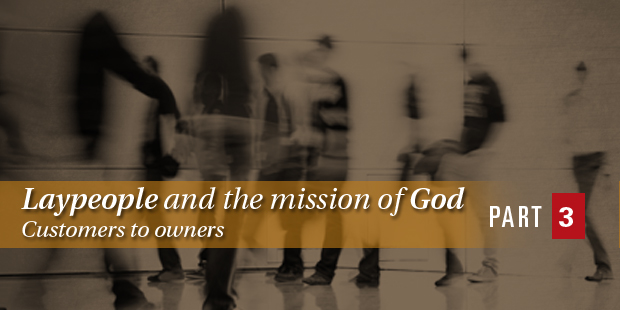
Laypeople and the Mission of God, Part 3
I continue my series today about laypeople and the mission of God. Let me start with a crisis point in my ministry that helped me to see the issue more clearly.
When I planted a church in Pennsylvania we started strong, particularly for the North, by growing to 125 the first year. We had 25 people in our core and 100 new people who came over the course of the first year. But the new 100 people didn’t do anything. They were passive spectators rather than active participants in the mission of God. And so we recognized that we had a cultural problem within the congregation.
There was a culture of non-participation. People came to be objects of ministry rather than co-laborers on mission. They wanted to be what I could call today “customers of the religious goods and services” distributed by our exciting new church. And, it was killing me.
I spent hour upon hour ministering, calling, working, and begging others to do that same. It was not working as people preferred to receive rather than to give.
So, we began to change the atmosphere to one of expectation that people will serve in ministry.
My motivation was not so complicated. What I tried to do was to shift the culture in my church from passivity to activity. When new people came into our church, most of them connected to the 100 passive people instead of the 25 active. A bad situation became worse.
So we took a full year to make a change through preaching, teaching, and training. We realized that we had to help people get it, so we did. We launched an internal campaign that was driven by a compelling question: “How do we shape the value of active service into our people?” And so over the course I preached messages about serving, we talked about it in small groups, and we did a training campaign on it. Finally, we asked the 25 to put positive, gracious peer pressure on the 100.
We had a print campaign, testimonies and videos. We went to each other’s houses and encouraged everyone to get involved. The end result was we wanted to change the atmosphere of expectation that people are responsible for the ministry of the church.
Part of the challenge was not just saying, “Hey, Jerry, you really need to do this.” We needed the tools and clear next steps. So we said, “Jerry, we want you to do this, but we want to train you for this. We have a course we want you to go through, a series of three courses. Would you go through this one with us?” At first it was slow over but over time people began to change.
How did it go? Well, not everybody got on board. One person in our church came to me and said, “Ed, my wife and I don’t think we should have to go through these classes. We’ve been Christians our whole lives, and why do we have to do that?” I said, “I totally get that, but this is the way we do it here at our church.” And I confessed, “Listen, I totally get that there’s no biblical command to go through these three courses, but our leadership and our church decided that this is the best way that God would have us to do things. So if this is your church, then this is what we think you should do.” So, they promptly left the church– and soon another left.
So, I’d encourage you to consider five truths about the tendency to being a customer of the church.
First, people naturally want to be objects of the ministry, not partners in it. That’s why the Bible says, “consider one another to provoke unto love and to good works” (Hebrews 10:24, KJV).
Second, people want to see others serving while they are the one being served. That’s why the Bible says, “Based on the gift EACH ONE has received, use it to serve others, as good managers of the varied grace of God” (1 Peter 4:10, HCSB).
Third, if you are a pastor, one of your most important roles is to equip people for ministry. That’s why the Bible says that God gave leaders “for the training of the saints in the work of ministry, to build up the body of Christ” (Ephesians 4:12, HCSB).
Fourth, it is not natural to be a giver. It is natural to be a receiver. That is what we desire, but that selfishness is what the Bible speaks against. That’s why the Bible reminds us that it is “more blessed to give than to receive” (Acts 20:35).
Fifth, when only pastors do for people what God has called all His people to do, everyone gets hurt and the mission of God is hindered. God has given gifts to his people for the good of all. That’s why the Bible says, “a demonstration of the Spirit is given to each person to produce what is beneficial” (1 Corinthians 12:7).
When God’s people think less like customers of the ministry and, instead, see themselves as the owners of the ministry, it’s a whole different kind of church.
The next post in this series will unpack the incredible resource for the mission of God that is sitting comfortably right under our noses each Sunday.
When we change our expectations of God’s people we might be surprised at what God does.
Read Part 4 here; go back to Part 2 here.
Read more from Ed here.

Tags: Ed Stetzer, Serve













